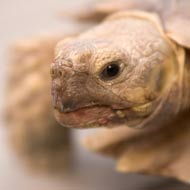Petition calls for microchip rules to be reconsidered

The group has contacted a number of specialist reptile vets and says over two dozen advised that they do not agree with microchipping tortoises from 60mm.
A petition has been launched calling for Cites to reverse its decision to change microchipping rules for tortoises, amid concerns that the practice could cause ‘undue pain and suffering’.
All tortoises of 60mm SCL (straight carapace length) or above must now be microchipped before they can be issued with an Article 10 Certificate. Previously, tortoises of less than 100mm SCL did not require a microchip.
The Tortoise Protection Group, which started the petition, said in a statement: ‘Whilst we applaud and support any legislation to reduce the trafficking of illegal tortoises, we do not believe in any legislation that causes undue pain and suffering to an animal, or putting any animal’s health at risk.’
The group has contacted a number of specialist reptile vets and says over two dozen advised that they do not agree with microchipping tortoises from 60mm SCL. Some have even refused to microchip tortoises as small as this.
Burnham House Veterinary Surgery in Dover supplied the group with x-ray images that demonstrate their concerns. In one x-ray, a tortoise of 60mm is shown lying over an applicator gun which would be inserted into the animal’s leg. However, the gun appears to be as wide as the bone in the tortoise’s rear leg. Another image shows the tortoise lying over a mini microchip, showing its relative size compared with the rear leg.
The Tortoise Protection Group says it will be writing to UK Cites with its x-ray evidence, as well as evidence from reptile vets, in the hope that they will reinstate the 100mm rule. A petition is also running on Care2 Petitions: http://www.thepetitionsite.com/takeaction/925/155/763/?taf_id=40216450&cid=fb_na



 The latest
The latest